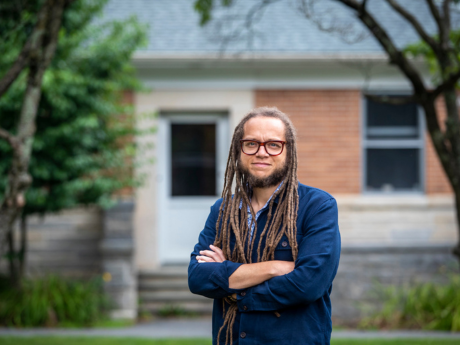Award Winners
Alice Fay Di Castagnola Award - 2023
Iain Haley Pollock
Finalists
Deborah Paredez
Paul Tran

Danse Printemps et Quarantaine
Near the end of my run
before the road turns steeply
uphill toward the house, I see
a girl alone on her front lawn.
The day is beautiful, cloudless
& cerulean, the latest in a string
of beautiful days. The girl has wound
her long black hair into a tight bun
& wears brown plastic-framed glasses
not unlike my own & dances.
If she is dancing to music, I can’t
hear it. But then I don’t listen too intently:
I want her to be dancing to music
only she can hear.
I imagine the virus
has kept her out of a studio for months.
I imagine she has danced only
in her basement or to the blue glare
of a computer screen, disconnected
from the other dancers.
Besides plié,
I do not have the language of dance
to describe the few moves she performs while
I run past. In the last one I catch, a Cubist
discombobulation of limbs, she archespr
her back until her hands touch the ground
& then throws each leg separately
over her head in a movement that would,
if I attempted it, break into pieces
my embrittled body.
Whatever I become
from here, I always want to be
this girl.
Dancing—I suppose, yes—
dancing while people are dying.
Not out of callow or callous
indifference. But in celebration
of the dead. Celebration expressed
as survival. Survival expressed
as a clamant act of love, an act
not native only to me but practiced
until it resides in me, muscle & sinew,
an imperfect act that is the only one
I can think to do.
Dancing.
Dancing, until the imagined company
of dancers spins & bends around me, until
the music others cannot hear renders itself
visible in my body.
Dancing, until each passerby
believes again in cloudless & cerulean. Again
in this day & the possibility of the next.
Wayne Miller on Iain Haley Pollock
There were so many excellent manuscripts to consider for the Alice Fay Di Castagnola Award, but this one stood out not only for its range of approaches, but also for its ethical complexity. For some time I’ve been interested in poems that engage with public concerns—the construction of history, the wrangles of sociopolitics—but such poems can run the risk of offering simplified moral positions, which can propel readers toward rhetoric and away from poetry. The poems in this manuscript, in contrast, are self-reflective and self-conflicted as they consider how our country, with its “primitive, / bullhorned violence,” pushes its citizens (including the speaker) to make “a myth of the land / and of the self”; as they present a biracial family’s complicated relationship with the foundational sources of Western culture; as they examine how “moral currents” can so often cut in multiple, surprising directions. The poems also assert the value of “dancing while people are dying,” since dancing is partially a celebration of the dead, and they bump up against both the indifference of nature and the limits of personal agency. This work’s consistent embrace of complexity and unresolvability—combined with its technical adeptness—makes it one of those rare collections of poems that keeps opening and opening as you read it.
**
Iain Haley Pollock is the author of the poetry collections Ghost, Like a Place, which was nominated for an NAACP Image Award, and Spit Back a Boy, winner of the Cave Canem Poetry Prize. He serves as Director of the MFA Program at Manhattanville College and lives with his family in the Lower Hudson Valley.
**
Finalists
Deborah Paredez is the author of the poetry collections This Side of Skin and Year of the Dog, winner of the 2020 Writers’ League of Texas Poetry Book Award and a New York Times “New and Notable Poetry Book.” She is a professor of creative writing and ethnic studies at Columbia University and the cofounder of CantoMundo, a national organization dedicated to Latinx poets and poetry. Her book of literary nonfiction, American Diva, is forthcoming from Norton. She's currently at work on the poetry collection Shore Shorn.
Paul Tran is the author of the debut poetry collection All the Flowers Kneeling (Penguin, 2022), which won the Golden Poppy Award and was a finalist for the PEN Open Book Award, Kate Tufts Discovery Award, and Lambda Literary Award. Their work appears in The New York Times, The New Yorker, Best American Poetry, and elsewhere. A recipient of the Discovery/Boston Review Poetry Prize, as well as fellowships from the Poetry Foundation, Stanford University, and the National Endowment for the Arts, Paul is an Assistant Professor of English and Asian American Studies at the University of Wisconsin-Madison.
